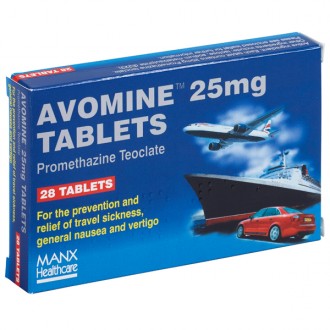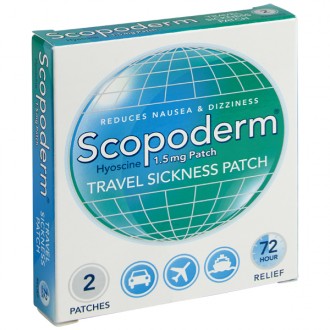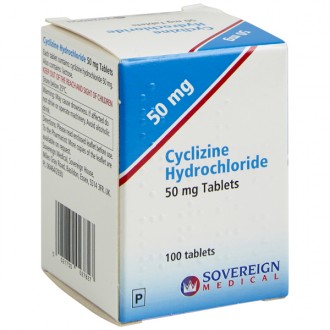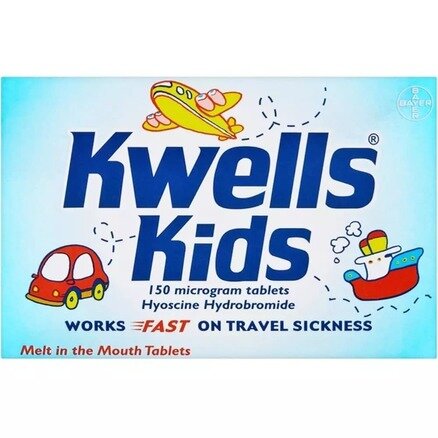Travel sickness (motion sickness) is feeling nauseous when travelling by plane, car, boat, or train. Travel sickness is a common challenge that can turn an exciting journey into a distressing ordeal. Most people experiencing motion sickness have discomfort in the stomach or vomiting. It can be prevented by eating small meals, drinking plenty of water or ginger tea, or keeping a fixed focus point and not looking at moving cars or waves. You can also relieve symptoms of car sickness with travel sickness bands and travel sickness tablets.
At Pharmacy Online, we offer medications specifically designed to treat travel sickness and help with preventing motion sickness. Our experts are always ready to guide you with personalised advice.
What is travel sickness?
Travel sickness, also known as motion sickness, occurs when there's a conflict between what your eyes see and what your inner ear, which helps with balance, senses. This mismatch sends mixed signals to your brain, causing symptoms of motion sickness like nausea, dizziness, and sweating. It's a common condition affecting people of all ages, though some are more susceptible than others.
The symptoms of travel sickness can range from mild to severe, including nausea, dizziness, sweating, and in some cases, vomiting. It's an experience that varies widely among individuals; some may feel symptoms strongly, while others might not experience them at all.
Understanding travel sickness is key to managing it. It's not just a simple case of feeling unwell; it can significantly impact your ability to enjoy journeys. This condition is a complex interplay of sensory inputs and individual susceptibility, meaning it can be triggered not only by actual movement but also by the anticipation or fear of travel.
Causes and triggers of motion sickness
When you travel, your inner ear, eyes, and sensory nerves send different signals to your brain. The inner ear senses motion, but your eyes might not always see it, especially in situations like being in a car or on a ship. This disconnection is what typically triggers motion sickness.
Several factors can increase the likelihood of experiencing motion sickness. Being in a moving vehicle like a car, bus, boat, or plane is the most common trigger. However, activities like watching a fast-paced movie or playing a video game can also cause similar symptoms.
Individual susceptibility plays a significant role:
- Stress and anxiety can also amplify the risk, as can certain odors and strong smells.
- Some people are more prone to motion sickness, especially those with a history of migraines, vestibular disorders, or hormonal changes.
- Reading while in motion is a well-known trigger because it involves focusing your sight on a stationary object while your body senses movement.
Understanding these causes and triggers will help manage and prevent motion sickness. It's about finding a balance between what your body feels and what your eyes see, and sometimes, making adjustments to your environment to reduce the sensory conflict.
Differential diagnosis: what else could it be?
Before you get motion sickness diagnosed, it's important to consider other conditions which present with similar symptoms.
- Moreover, anxiety and panic disorders can manifest physically with symptoms like nausea and a sense of disorientation, further complicating the diagnosis.
- Similarly, migraine-related vestibular disorders can produce symptoms like motion sickness, including sensitivity to movement and balance issues.
- Vertigo is one such condition that closely mimics travel sickness. Caused by issues within the inner ears, vertigo brings about a spinning sensation, which can be confused with the dizziness of motion sickness.
- Gastrointestinal problems, such as gastritis or peptic ulcers, can also cause nausea and discomfort, often mistaken for travel sickness. These conditions require distinct medical treatments.
- Morning sickness, commonly experienced in pregnancy, is another condition that can be confused with motion sickness. Characterised primarily by nausea and vomiting, morning sickness is linked to hormonal changes during pregnancy.
A healthcare professional can differentiate between these conditions based on your medical history, symptom patterns, and, in some cases, further diagnostic tests. Distinguishing between these various possibilities means you receive the most effective treatment and guidance for your specific condition.
Motion sickness symptoms
Motion sickness can manifest through a range of symptoms. The most common symptom is nausea, a queasy feeling that can range from mild discomfort to severe upset stomach. Accompanying this are often feelings of dizziness and lightheadedness, as if you can't quite keep your balance or focus.
Another frequent symptom is cold sweats, combined with a general sense of unease and discomfort. You might also experience increased salivation, which is your body's natural response to nausea. Some people report a headache or migraine-like symptoms, including sensitivity to light and sound.
More severe cases of motion sickness can lead to vomiting, which can be distressing and exacerbate dehydration and weakness. Fatigue is another common symptom, leaving you feeling drained and unable to enjoy your journey.
Diagnosing travel sickness
Diagnosing travel sickness typically involves a review of your symptoms and travel history. Unlike many medical conditions, travel sickness doesn’t require complex tests for diagnosis. Instead, it's often identified based on a description of your experiences. Key factors include the onset of symptoms in relation to travel and the specific types of movement that trigger these symptoms.
During a consultation, a healthcare professional will ask about the nature, duration, and intensity of your symptoms. They'll enquire about specific situations that provoke these feelings, such as travelling in a car, boat, airplane, or even while watching motion-intensive media.
Always seek medical advice if your symptoms are severe, persistent, or if over-the-counter remedies haven't provided relief. Medical consultation is also essential if you experience symptoms outside of travel, as this can indicate a more serious underlying condition.
How to treat motion sickness
Treating motion sickness effectively involves a combination of medications, self-care techniques, and preventative measures. The choice of treatment often depends on the severity of your symptoms and your specific needs.
Medications
Over-the-counter and prescription medications are a common and effective way to manage motion sickness. Antihistamines like Avomine and Clizine are frequently used, or for children, they can try Kwells Kids. These work by blocking the signals in the brain that cause nausea and dizziness. However, they can cause drowsiness, so it's important to know how they affect you before travelling.
Prescription medications
For more severe cases, your doctor might prescribe Scopoderm, which comes in a patch form. It's placed behind the ear several hours before travelling and can be effective for up to three days.
Ginger
A natural remedy, ginger is known for its anti-nausea properties. It can be taken in various forms, such as capsules, tea, or even raw ginger, to alleviate symptoms.
Behavioural techniques
Techniques such as focusing on the horizon, getting fresh air, and avoiding reading while travelling can help. Some people find relief through acupressure wristbands, which apply pressure to specific points to reduce nausea.
Preventative measures
Planning ahead can also help. Choose seats with the least motion (e.g., front seats in a car, wings of an airplane), and avoid heavy meals or alcohol before travelling will all ease motion sickness.
Each treatment has its benefits and limitations. You might need to try a combination of these methods to find what works best for you. For further information, speak with one of our pharmacists who can provide personalised advice and treatment options.









